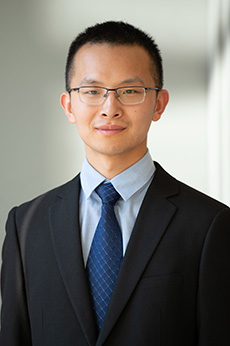As water scarcity intensifies and demand for critical resources grows, innovative solutions for sustainable water purification and resource extraction are essential. Professor Xitong Liu is tackling both challenges head-on by advancing technologies that aim to transform environmental engineering. Liu’s impactful work earned him a spot on the American Academy of Environmental Engineers & Scientists’ 2025 40 Under 40 Award list of recipients, recognizing his significant contributions to the field over the past year.
Liu grew up in a coal mining city where he witnessed firsthand the negative impacts of industrial activity. From polluted waterways and degraded air quality to altered landscapes from resource extraction, these early encounters drove him to pursue a career protecting the environment by combining his aptitude for science with practical solutions to pressing issues.
“This led me to environmental engineering, where I discovered the power of technology to address problems like water contamination and sustainable resource use,” Liu stated.
After earning his B.S. and M.S. from Nanjing University, Liu obtained his doctorate from Johns Hopkins University in 2017. Now leading federally funded research at GW Engineering, Liu’s group examines environmental interfacial phenomena to develop durable, selective, and cost-effective separation technologies for water purification and resource recovery. His work has been published in leading journals like Environmental Science & Technology and Nature Communications.
Liu’s research addresses two major issues in water purification: desalination and groundwater remediation. His work on anti-fouling membranes tackles inefficiencies in desalination caused by organic and inorganic buildup, utilizing novel coatings that enhance fouling resistance while reducing energy consumption and extending system lifespans. Simultaneously, his group studies colloidal activated carbon barriers to remediate per- and polyfluoroalkyl substances, commonly known as “forever chemicals,” which pose serious health risks. Together, these advancements pave the way for safer and more resilient water treatment systems.
For sustainable resource extraction, Liu’s team published a study in Nature Communications detailing their electrochemical technology for selectively extracting lithium from geothermal brines and wastewater—a potential game-changer for sourcing this mineral integral to the global clean energy transition.
Students involved in each of Liu’s research areas have carried these efforts beyond the lab, pitching innovations in water purification membranes and lithium extraction in competitions at GW and national stages like the Department of Energy’s Geothermal Lithium Extraction Prize.
“Receiving this recognition is both a great honor for my research group and a validation of the impact our work can have in addressing environmental challenges. It energizes our team and reinforces our commitment to advancing these environmental technologies toward commercialization and broader adoption,” said Liu.


